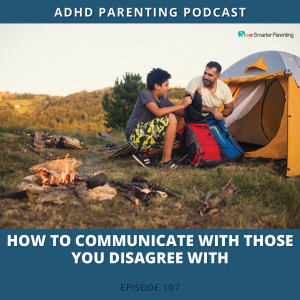
809.3K
Downloads
213
Episodes
Drawing on years of experience working with families, Parenting Coaches Siope Kinikini and Kimber Petersen share how families can improve, heal, and find success using the proven methods of the Teaching-Family Model. Visit smarterparenting.com to learn more.
Episodes

Wednesday Oct 28, 2020
Ep #107: How to communicate with those you disagree with
Wednesday Oct 28, 2020
Wednesday Oct 28, 2020
If there is one podcast we recommend listening to in the wake of what is going on globally, this is it.
We hope you will share it once you have listened to it.
Many have lost the ability to discuss topics they feel strongly about with someone who doesn't share their viewpoint without it turning ugly. Cancel culture, name-calling, fear of retribution, and lack of civility are alive and well.
This lack of civility is dangerous because it doesn't encourage growth or moving forward. Instead, we become even more passionate about what we believe.
We don't have to agree with someone, but we can learn to communicate openly and safely that fosters understanding. We must teach our children how to do this as we want a world where our children can express themselves and allow others to do the same.
Our view of the world is shaped by what we have experienced, and we view those experiences as sacred. When those beliefs are attacked, it can feel very personal, which creates an emotional response.
When someone believes something different from us and presents that viewpoint, it creates internal feelings of conflict as we don't like having what we believe challenged. This is called cognitive dissonance. Cognitive dissonance makes us feel uncomfortable when a different viewpoint is presented. There's inner turmoil to figure out where this person is coming from and why they believe what they believe, so often, it is easier not to wade into, but rather to become defensive and dismissive as we see it as a way to protect what we believe.
What parent doesn't want their child to feel comfortable coming to them and talking about sexuality and sex, what they believe (even if it's different than you), cause and movements, politics, and life-choices? If you haven't created a place where understanding can occur, these will not be productive conversations. Instead, these conversations could lead to a breakdown in relationships.
Effective Communication breaks down barriers and the emotional response we have, which allows us to get to a place where we can find solutions and understanding. Effective Communication will enable us to create a safe space to discuss difficult topics without it getting personal or argumentative.
Stephen R. Covey said, "Most people do not listen with the intent to understand; they listen with the intent to reply."
Effective Communication shows us how to listen and understand where the other person is coming from. Remember, you don't always have to agree with what they say. When you know where someone is coming from, you are more likely to find solutions and understanding.
Let’s use Effective Communication to create connections instead of division.
To learn more about Effective Communication, visit the Smarter Parenting website: https://www.smarterparenting.com/skills/effective-communication/
